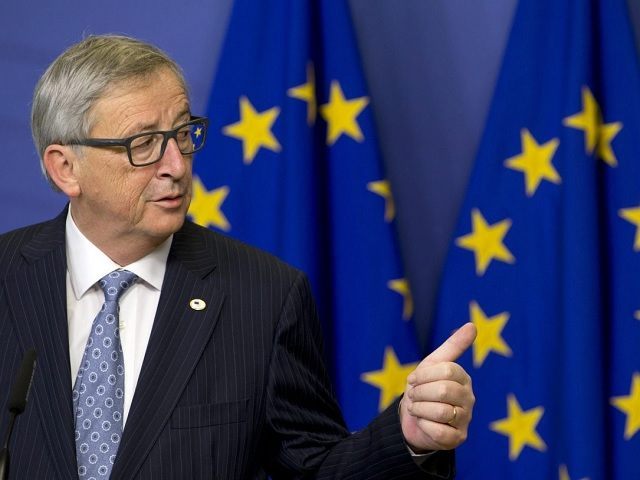Brussels is becoming less democratic and more monolithic by the week. At a time when 76 per cent of EU citizens believe corruption is widespread across the European Union, why is Britain giving away our personal and financial data?
We live in a highly volatile world, one in which we must carefully guard our freedom and our security. However, the EU makes every effort to piggyback onto every crisis, slowly endangering both.
As Get Britain Out reported back in July, the EU was set to expand its surveillance powers in the name of security. This was in reaction to the threat of Islamist terrorism, and the so-called ‘Passengers Name Record’ (PNR) has been rushed forward.
The PNR will be a large EU database monitoring all EU citizens travelling by air in the European Union. The data collected will be on a mass scale beyond the current system Britain has in place.
The last thing British families want to worry about while packing for trips abroad is the misuse of their personal information. In the age of the information revolution and government profiling, how long is it until a leak or hacking scandal puts such sensitive information at risk? The European Aviation Body has already said hackers could infiltrate critical systems relating to aviation infrastucrture.
It’s no coincidence the decision has been made after the recent atrocities in Paris. Using the current climate of near panic as an opportunity, the EU has found another way to expand its powers over us. The EU’s Civil Liberties Committee originally rejected the proposals in 2013, but the the same bill recently passed by 38 votes to 19.
This means passengers’ information ranging from credit cards, contact details, travel itinerary, and even your dietary requirements will be stored. Rather than targeted procedures against specific threats to national security, the EU is making the long known mistake of knee-jerk reactions. Fear is being used as an opportunity to expand state power.
Despite existing arrangements already being in place at national level in Britain, Brussels now wants to centralise and manage our security. The fact we already have our own PNR system was somehow ignored by Home Secretary Theresa May when she pushed for agreement while in Brussels recently.
May said “Europe today must come together, must work further together to increase the sharing of information across borders, and passenger name records is important in this.”
This is the same Europe which has naively kept the Schengen Zone open during the current climate of mass migration. As revealed recently, over one million migrants entered the EU in the last 12 months. Such a policy allowed terrorist Salah Abdeslam to escape through 6 ‘borders’ after the Paris attacks, and he has still not been found. It would appear the EU is trying to use ineffective gestures to appease an uneasy public, without addressing the elephant in the room.
So besides doing nothing about the migration crisis and the threat of uncontrolled borders, what exactly does the PNR actually provide? It places more jurisdiction on a pan-European level, despite Britain already having a self-funded system in place.
Even Giovanni Buttarelli, the European Data Protection Supervisor (EDPS), has said the ruling is neither proportionate, nor necessary. The indiscriminate and blanket targeting of people’s data is not only an infringement on individual liberties, but it also does nothing to address these EU-induced problems. The system only provides a false sense of security which Brussels is hoping to claim responsibility for.
The European Commission will divide over £36 million among its Member States to fund the PNR. However it is essentially recycling individual membership fees back to the country in question. Like many EU projects, it hides the fact EU-branding is charged back to taxpayers, while appearing as if Brussels generously hands the funds out of thin air.
While the directive claims information will be obtained only for the prevention and investigation of a serious crime, it is only a matter of time before the system is abused as it allows other Member States to access the details of travelling Britons. The PNR system already in place in Britain has worked so far, and the EU taking over security matters is consolidating our independent prevention strategy into one pan-European retention system.
Britain will pay the price of such knee-jerk reactions, as Cameron ‘tries’ to halt the transfer of powers to Brussels. To date, there is no proof mass data surveillance plays any part in preventing terrorist attacks, intelligence services rightly target ‘risk flights’ or suspects, not the blanket 42 pieces of information they will soon require from passengers under the PNR. Power to fight terrorism and crime is still being handed over to the EU,while fears of attacks are high on everyone’s minds.
This week, Olivier Jankovec, director of Airports Council International Europe said he was ‘astonished’ the bill took so long to go through. The reason is quite simple: the PNR system does nothing to address the contributing factors to current terror threats – the EU’s open border policy with the Schengen Agreement, and the toxic issue of home grown terrorists.
Internal security can now only be managed if we Get Britain Out of the EU. We will still cooperate with our European partners, as we do with countless nations outside the EU. The collection of our personal data should be secure, responsive and targeted. Brussels clearly has other interests in mind as it marches on towards a federal state. Misleadingly, Brussels will falsely claim this move is for the safety of all Member States.
Chris Muspratt is a researcher for the cross-party grassroots Eurosceptic campaign group Get Britain Out

COMMENTS
Please let us know if you're having issues with commenting.